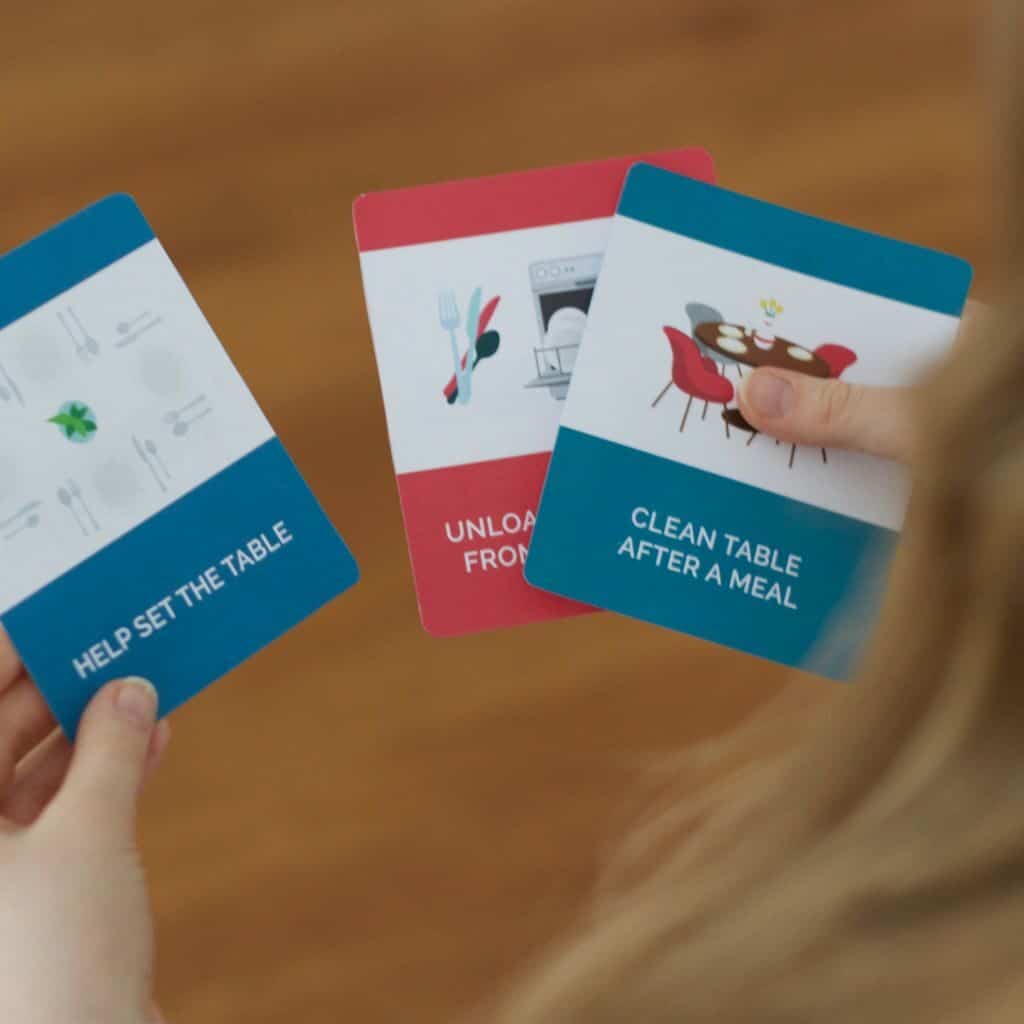How to Get Kids Started on Chores – and Keep Them Motivated
Giving kids chores teaches life skills and sets them up for success in many areas of life, but starting is half the battle. Here’s advice on how to begin and be successful.

“Wow, thanks for doing that, girls,” my friend exclaimed.
We were just wrapping up dinner at her house and without being asked, my daughters started picking up empty plates around the table.
It’s possible my girls were motivated by what came next – dessert. And they knew that clearing dishes would expedite getting brownies and ice cream onto the table.
But I also like to believe that after years of doing chores around our house, clearing dishes from a table felt like a natural responsibility they could take on, and so they did.
Why giving kids chores is important
Having kids do household tasks may not seem like a high priority for parents. One might argue kids shouldn’t be burdened with household tasks. Or that it’s more important for children to focus on academics or sports.
But research shows that kids who begin doing chores when they’re young are more likely to have good relationships with family and friends, achieve academic and early career success, feel a greater sense of belonging in their family, and grow to be self-sufficient.
Chores also:
- Make kids feel they’re important contributors to the family which increases their self-esteem and reduces a sense of entitlement.
- Teach kids that everyone must do unpleasant grunt work every now, which builds a good work ethic
- Encourages a sense of responsibility in children, as learning to pitch in and help becomes natural.
It’s also worth noting that 30% of marriages end in divorce over household chores. So being competent and having a sense of responsibility for keeping a house clean will even help our children’s future relationships and marriages.
Interested in getting your kids started on chores? My four-lesson course will teach you how to get started, avoid nagging & power struggles, and keep your kids motivated. Click here or the image below to learn more.

How to get started:
Now that you know why chores benefit kids, the first hurdle is to actually begin.
Getting started on kids chores does take a bit of up-front work. But if it’s approached with the right attitude and tone, kids are likely to take on household tasks with ease. And soon chores will simply be a normal part of your daily routine.
And while your children will likely need reminders to do their assigned work, setting the right tone from the beginning and maintaining it helps keep kids motivated and can prevent common conflicts.
Begin chores as early as possible
If your child is still very young, you have the advantage of being able to embrace her desire to try new things and be helpful.
Toddlers and preschoolers are eager helpers, but that eagerness to help can fade if it isn’t nurtured early on.
That said, younger kids’ help is usually the opposite of actually being helpful. And it can often seem like a burden to let your toddler fold towels or wash windows knowing you’ll just have to do the chore over again.
But keep in mind that inconvenience in the moment will pay off later on. Having the opportunity to help, your young child will view himself as a helper.
When children are very young, it may not be possible or necessary to assign chores. But harnessing your child’s willingness to help can be enough. Turning cleaning into a bit of a game – by having kids choose a chore card from a bowl every day – can set a playful tone.
To read more about toddler chores see: 7 Tips to Help You Begin Toddler Chores Successfully
And if your children are beyond the toddler and preschool age group, there’s still hope! As long as chores are approached with the right attitude, kids of any age will grow accustomed to them.
Begin with a family meeting
Once you’ve determined it’s time for your kids to do chores, have a family meeting to discuss the division of labor in your house.
Emphasize that everyone in the family cleans, including kids and parents. And that it’s in everyone’s interest to maintain a clean and tidy home.
Next, your family can discuss which household tasks must be done and who will complete them. Writing everything down can ensure everyone is on the same page. And talking about what parents do around the house may be eye-opening to kids who previously weren’t aware of how their parents contribute to the family.
Creating a sense of teamwork during this discussion is important. Kids will be more motivated to help if they feel part of a family working together for a greater good.
Imposing chores on kids, without giving them any say in the process, will have the opposite effect and make their work feel like a burden.
Use visual aids to remind everyone of what they need to do
Once you decide who will do what, visual reminders are helpful.
During the early stages, when kids are just beginning to do housework, it can be easy for both parents and kids to forget about them.
- Chore cards can be a good reminder to pre-readers who can use visual prompts to remember what needs to be completed daily.
- A chore chart can help older children and teens remember what needs to be done and can be especially helpful if household tasks are swapped between siblings each day.
Get your kids started on chores with these cards. They can serve as a visual reminder for kids and make doing chores fun! Click here to learn more.
How to keep kids motivated
Now that your kids have begun doing chores, you’re probably wondering how to keep them motivated.
First off, keep in mind that everyone, including kids, wants to feel responsible. They also want to feel that they’re part of a team and contributing to a greater good. These good feelings alone can help fuel a motivation to do chores.
And since you’ve started off on the right foot – by communicating a sense of working together as a family to keep the house clean – you’ve already laid the groundwork for success.
Take time to teach kids how to do their chores
Kids will feel more motivated if they feel competent. So teaching them how to do their assigned work is important.
Using a vacuum or emptying the dishwasher may come as second nature to us. But even though these household tasks appear easy, kids typically need a bit of guidance on how to do them well.
When cleaning a particular room, checklists can help kids keep track of what needs to get done and in what order. For a single task, provide kids with a step-by-step tutorial on how to complete it well. But remember that it might take a few tries before they remember everything you’ve said.
But what if my child simply won’t do his chores?
Even if you’ve done everything “right” and tried to build a sense of family teamwork, there will likely come a time when your child just won’t do his or her chores.
Here are a few ways to address this situation:
- Pick a time of day: It’s helpful for kids and parents to pick a time of day to do chores. That way there’s no confusion or misunderstanding about when things need to be done. Letting your children pick a time (within reason – midnight won’t work, for example) lets them feel in control of their destiny.
- Apply the “First Things First” rule: Make it clear to your children that chores must be completed before other activities occur. For example, they come before any screen time, visiting with a friend, or eating dessert. It’s best to talk to kids about this rule during your initial family meeting so everyone knows expectations.
Your kids may push back on completing chores when they first start doing them. Everyone tends to feel resistance to beginning new things. It may take some resolve on your part to not back down and stick to the rules mentioned above. You may also want to set a reminder on your phone so you don’t forget.
Over time, with your gentle guidance, your child will begin to come around. Keep at it, all while reinforcing a sense of teamwork and communicating to your child that they’re a helpful part of maintaining the home. Positive reinforcement motivates better than condemnation.
Avoid doing these things that can demotivate kids to do household tasks
Either without knowing or realizing it, parents sometimes do things that can demotivate their kids to do chores.
Avoid doing these things to keep kids motivated:
- Don’t tie chores to allowance: For many parents, it feels natural to tie chores and allowance together to motivate kids. But research shows that a reward system can actually demotivate and unintentionally send counterproductive messages about family and responsibility. Also, paying kids to do their household tasks makes kids different from parents, which takes away from the sense of teamwork. Also, at some point, your child might decide they no longer want your money and therefore no longer need to do chores. Click here to read more about why tying chores and money together may have the opposite effect of what you intend.
- Try to let go of perfection: Adults know that a clean floor means not leaving dust bunnies in the corner and that a clean sink doesn’t include bits of dirt around the drain. Kids, on the other hand, are new to cleaning and aren’t always aware of these standards. Keep reminding yourself that kids are still learning and may need continued guidance. The best way to deliver that guidance is to start pointing out one thing your child did well and then ask “Can I give you some advice for next time?” Kids will be more open to your suggestions if you’ve asked their permission first.
- Be careful not to criticize or condemn: In having them do chores, we want our kids to feel competent and responsible, not incapable or lazy. Even if your child shows signs of laziness or isn’t completing a chore well, avoid criticizing them. Hearing a critique on character from a parent is the ultimate demotivator.
It can be aggravating when kids repeatedly don’t do a chore as you taught them. Try your best to keep your cool (it’s not always easy!) and stay focused on the larger goal of keeping kids motivated and ultimately demonstrating responsibility.
Cleaning Saturdays: getting the whole family involved
An addition or alternative to daily chores is to have the family do a Cleaning Saturday once a month.
The way it works is this: every family member chooses a room in the house to clean. For example, one parent could clean all the bathrooms, and the other parent could clean the kitchen. Kids could clean less intense rooms like the living room or dining room. And everyone cleans their own bedrooms.
The advantage of doing Cleaning Saturdays is that everyone is working together at the same time. Kids see their parents working alongside them as everyone cleans the house together.
It also means that by the end, the entire house is clean (at least for a few hours or a day), which creates a sense of accomplishment.
While kids may need guidance at first about how best to clean rooms, eventually they can begin to work independently. Chore lists like these Room Cleaning Cards can help serve as a checklist of what needs to be cleaned and in what order.
Don’t lose sight of why kids need chores!
Now that you know the best way to start kids’ chores, here’s the unfiltered truth: beginning kids’ chores isn’t always easy.
You may find yourself:
- Forgetting about your kids’ household tasks when days are jam-packed
- Feeling a sense of burden when you have to remind your kids to do their chores
- Finding it next to impossible to maintain your cool when assigned tasks aren’t done well
Often, it’s much easier to simply do chores yourself than to bother with all the inconveniences and annoyances that come with getting kids to clean and tidy up the house.
But it does get easier. And it is worth it.
Someday soon you, too, may find your kids offering to help put away dishes at a friend’s house (dessert or not).
And as your kids grow in responsibility, it will also feel good to see them confident in their ability to take on more.
See related:
List of Age-Appropriate Chores for Kids – List of Chores by Developmental Stage and Ability
13 of the Best Printable Chore Charts for Kids
How to Motivate Kids to Do Chores – Without Paying Them
How to Teach Kids to Do Their Own Laundry
How to Teach Your Kids to Pack Lunch Independently
5 Tips to Get Your Kids to Clean Their Messy Rooms
What to do next…
1. Subscribe to Self-Sufficient Kids’ email list.
Like what you read here and want to learn more? Every Thursday I’ll send you one parenting tip about raising self-sufficient kids and creating the peaceful relationship you yearn to have with your child. Click here to sign up.
2. Take one of my quizzes!
Find out if you’re raising a self-sufficient kid (click here) or if you’re doing too much for your kids (click here). At the end of each quiz, you’ll be asked to provide your email address to see the results.
3. Get your kids started on chores.
Learn how to get your child started on chores (& keep them motivated + avoid power struggles) by enrolling in my Get Your Kids Successfully Started on Chores course. Click here to learn more and sign up.

About Kerry Flatley
Hi! I’m Kerry, the mother of two girls and a certified parent educator. I believe it is possible for parents to have a supportive, loving, and warm relationship with their kids while raising them to be independent and ultimately self-sufficient. Over the years, I’ve read numerous books and articles that support this belief and I’ve put these ideas into practice with my own kids. Read more about me and Self-Sufficient Kids here.


